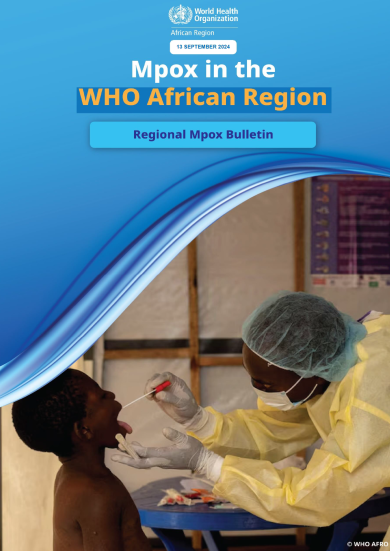
Regional Mpox Bulletin: 13 September 2024
Since 1 January 2022, cases of mpox have been reported to WHO from 20 Member States across the African continent (Including three countries from the EMRO region). In the AFRO region, as of 30 August 2024, a total of 8 153 laboratory confirmed cases, including 54 deaths, have been reported to WHO.
In 2024, as of 8 September 2024, the 14 affected countries have reported 5 776 confirmed cases, including 32 deaths. The three countries with the majority of the cases in 2024 are Democratic Republic of the Congo, (n = 5 160), Burundi, (n = 385), and Nigeria, (n = 55).
A significant number of suspected cases, that are clinically compatible with mpox are not tested due to limited diagnostic capacity and thus never get confirmed. For this reason, we include suspected cases in this section of the report.
In 2024, 14 countries have reported 25 237 suspected and confirmed cases, including 723 suspected and confirmed deaths.
This indicator should be interpreted with caution, as suspected mpox cases are recorded according to varying national case definitions. In some countries, suspected cases that undergo testing are not removed from the count, regardless of whether the test result is positive (confirmed case) or negative (discarded case). Moreover, not all countries have robust surveillance systems for mpox, meaning reported case counts are likely underestimate the extent of community transmission.
Burundi declared the mpox epidemic driven by clade Ib of the virus on 25 July 2024. The situation escalated rapidly in the following weeks and, as of 8 September 2024, a total of 1 648 suspected cases including 448 laboratory confirmed cases with no deaths have been reported in 29 out of the 49 districts. Burundi accounts for approximately 5% of cases reported in the African region. Among the confirmed cases, 56% are male, with children under 10 years of age making up 37.5% of the total cases. The most affected age groups are children under 10 years (40.0%). Both suspected and laboratory confirmed cases continue to rise steadily in the country. In the last 7 days, new cases (n=120) increased by 23.7% compared to the previous week (n=97).
Gabon reported its first confirmed case of mpox on 22 August in Libreville. The case involves a 30-year-old male who had recently travelled to Uganda, where he likely contracted the virus. Upon returning to Gabon, he developed symptoms, including fever, fatigue, and a generalized skin rash, and sought medical attention on 21 August. As of 8 September 2024, out of 15 suspected cases identified and tested, two tested positive for Mpox. No new case has been reported in the last 7 days compared to one case in the previous 7 days.
The Central African Republic: The most recent outbreak of mpox clade Ia was declared on 18 July 2024, and as of 8 September 2024, the country has cumulatively recorded 285 suspected cases, of which 50 have been confirmed, and one death reported in 11 health districts this year. In the last 6 weeks, four hotspot districts have been identified in the country, including Mbaïki, Kembe-Satema, Bangassou et Sangha-Mbaéré. New cases have not been reported in these past 6 weeks in the health districts of Bangui 2 et Bimbo.Three new cases have been reported in the last 7 days. A significant proportion of the confirmed cases involve younger individuals, with 25% being under 7 years of age and 75% being under 23 years old.
Cameroon: As of 10 September 2024, the country has reported a total of 47 suspected mpox cases, of which 6 have been confirmed including two related deaths, spread across 7 regions. No new case or death have been reported in the past week, following the case reported in week 35 which occurred several months after the last case and the situation was under control. The positivity rate stands at 17.1%, with Clade II identified in multiple regions. Mpox primarily affects women, with the most impacted age groups being children under 5 and adults aged 20-24 years. Laboratory capacity for Mpox testing remains limited, and there are challenges in community engagement and risk communication. The country has also received a donation of 500 vaccine doses from Africa CDC, and training efforts are being implemented to bolster preparedness.


